Module 10Lao SheTeahouseUnit 3Language in use
文档属性
| 名称 | Module 10Lao SheTeahouseUnit 3Language in use | 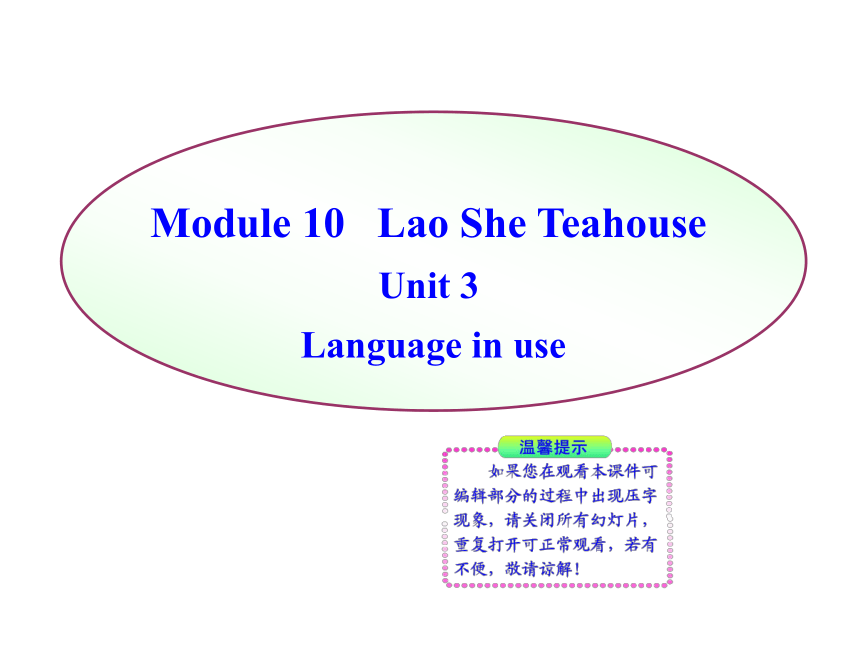 | |
| 格式 | zip | ||
| 文件大小 | 4.9MB | ||
| 资源类型 | 教案 | ||
| 版本资源 | 外研版 | ||
| 科目 | 英语 | ||
| 更新时间 | 2012-08-06 13:17:41 | ||
图片预览

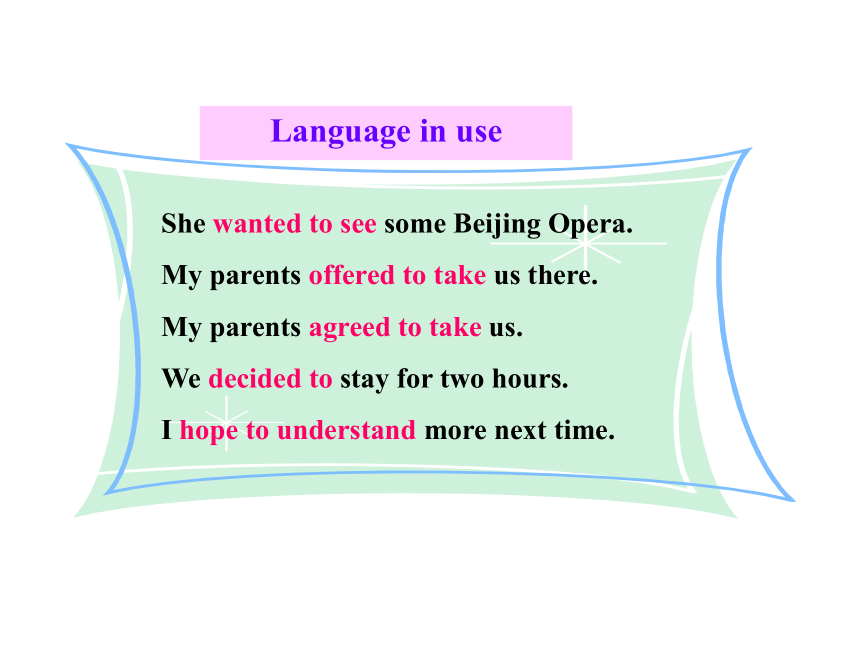
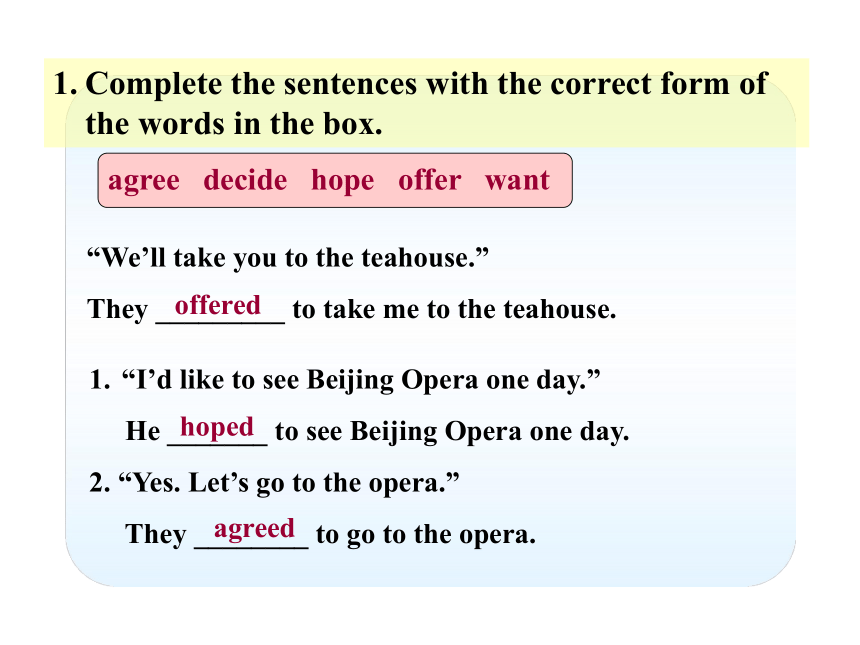
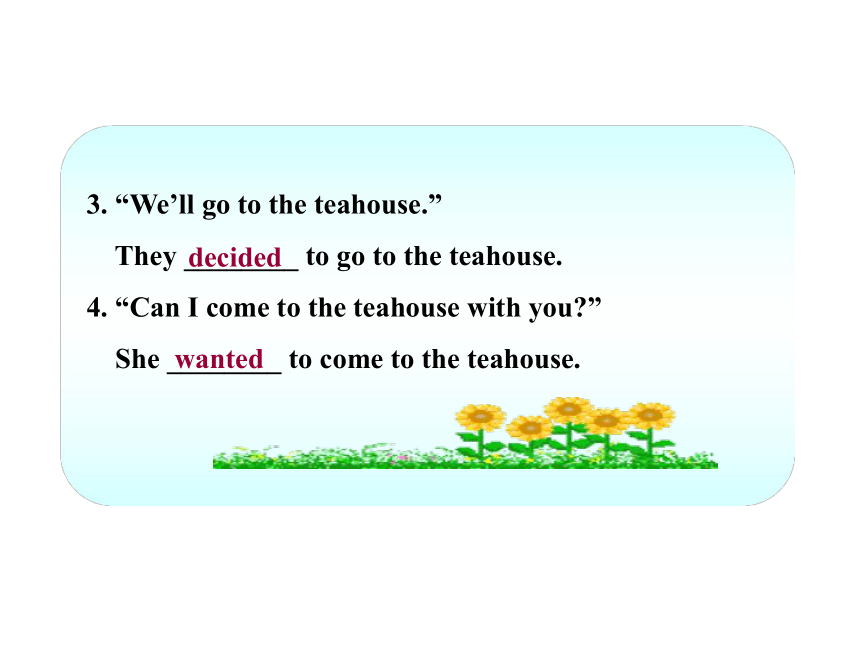
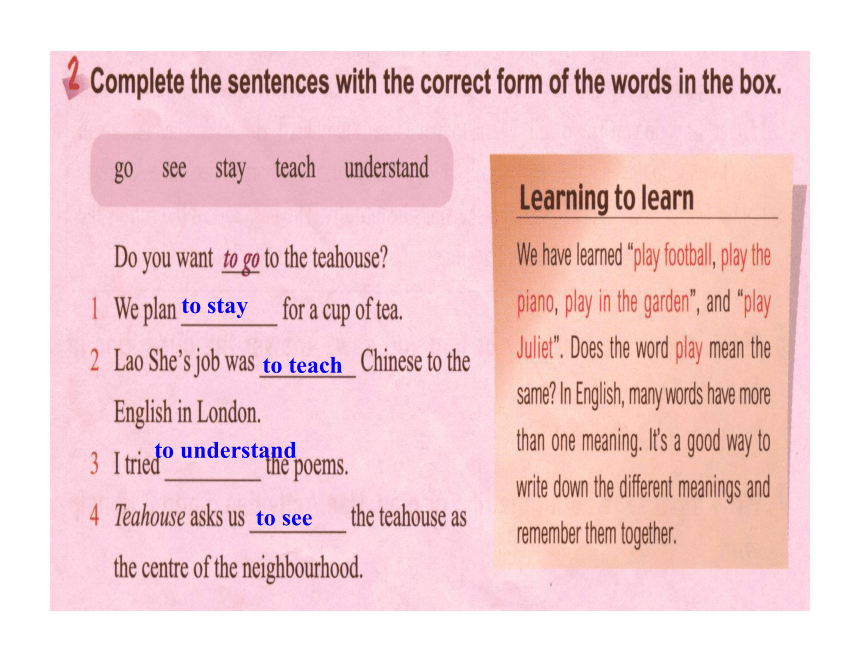
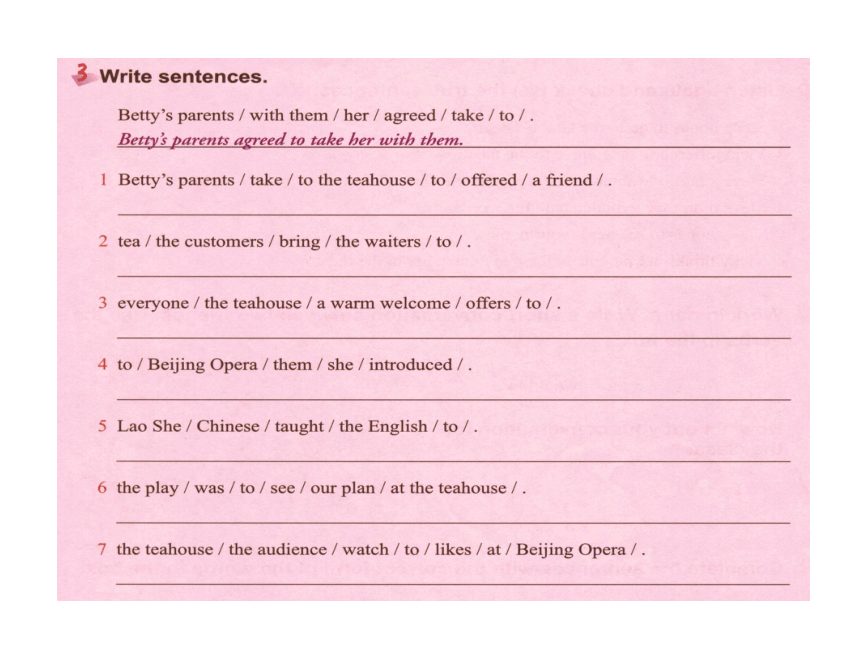

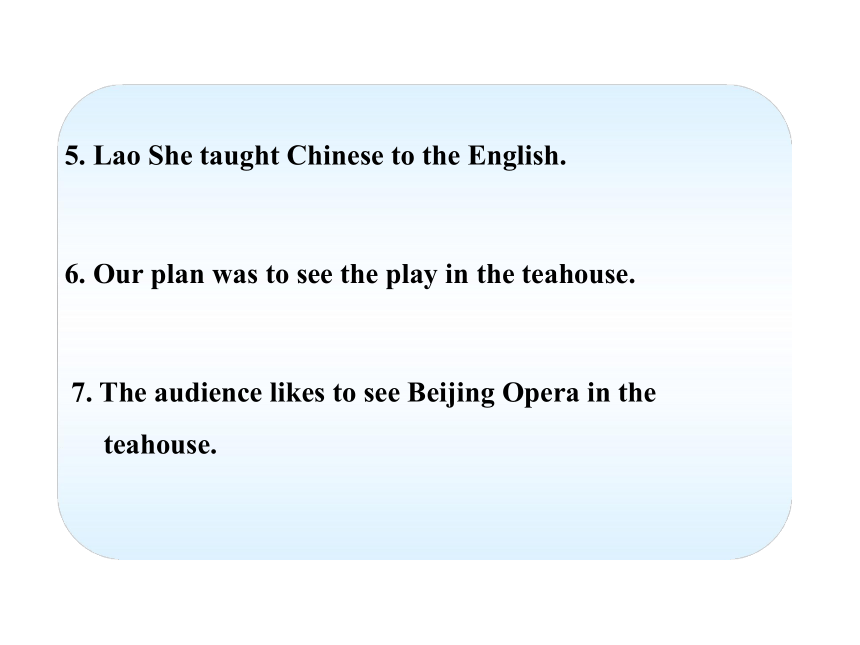

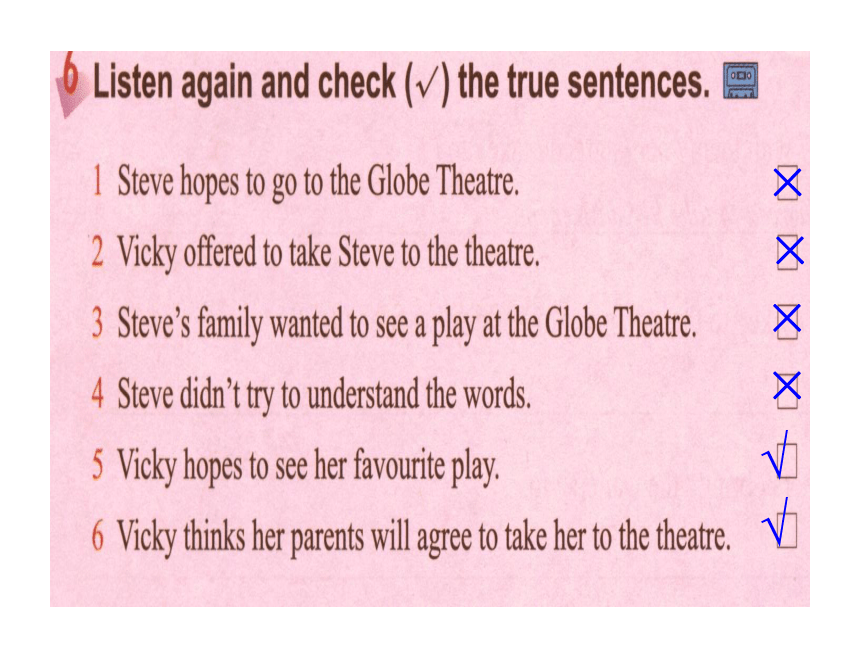

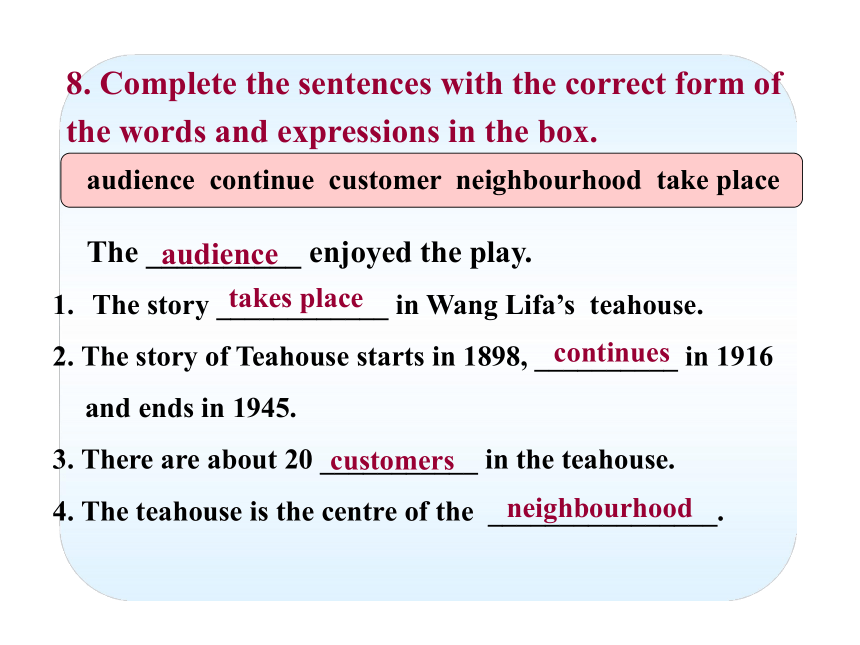
文档简介
(共33张PPT)
Module 10 Lao She Teahouse Unit 3 Language in use
She wanted to see some Beijing Opera.
My parents offered to take us there.
My parents agreed to take us.
We decided to stay for two hours.
I hope to understand more next time.
Language in use
Complete the sentences with the correct form of the words in the box.
agree decide hope offer want
“We’ll take you to the teahouse.”
They _________ to take me to the teahouse.
offered
“I’d like to see Beijing Opera one day.”
He _______ to see Beijing Opera one day.
2. “Yes. Let’s go to the opera.”
They ________ to go to the opera.
hoped
agreed
3. “We’ll go to the teahouse.”
They ________ to go to the teahouse.
4. “Can I come to the teahouse with you ”
She ________ to come to the teahouse.
decided
wanted
to stay
to teach
to understand
to see
1. Betty’s parents offered to take a friend to the teahouse.
2. The waiters bring tea to the customers.
3. The teahouse offers a warm welcome to everyone.
4. She introduced Beijing Opera to them.
5. Lao She taught Chinese to the English.
6. Our plan was to see the play in the teahouse.
7. The audience likes to see Beijing Opera in the teahouse.
5. Listen to the conversation and choose the correct answers.
Who is visiting london
a) Vicky.
b) Steve.
c) Romeo.
2. What are they talking about
a) What Steve did yesterday.
b) What Steve wants to do tomorrow.
c) What Steve often does.
√
√
√
√
×
×
×
×
8. Complete the sentences with the correct form of the words and expressions in the box.
audience continue customer neighbourhood take place
The __________ enjoyed the play.
audience
The story ____________ in Wang Lifa’s teahouse.
2. The story of Teahouse starts in 1898, __________ in 1916 and ends in 1945.
3. There are about 20 ___________ in the teahouse.
4. The teahouse is the centre of the ________________.
takes place
continues
customers
neighbourhood
wonderful
excellent
took place
magic
impossible
动词不定式和双宾语
生活中我们经常遇到“我努力去理解”、“决定留下来”等表
达方式,其中连续出现了两个动词,这种情况下英语应该
如何表达呢?首先请看下面的例句:
We decided to stay for a cup of tea.
我们决定留下来喝杯茶。
动词不定式置于谓语动词之后,作动词的宾语,表明意图,
希望或决定的内容。
1. 动词不定式作宾语
在英语中,并不是所有两个动词连用时都采用动词+不定式的形式,一般来说,用不定式时,所表示的多为将来的行为。但是在具体使用中同学们还要注意记忆,因为动词不同,对其后动词形式的要求也就不同。常见的后面接“to + 动词原形”作宾语的动词有:plan, decide, hope, want, agree, offer, try, like, love。
2. 双宾语
有些动词可以接两个宾语,即指人的间接宾语和指物的直
接宾语,这两个宾语称为“双宾语”。结构为“及物动词+间
宾+直宾”。有时还可用“及物动词+直宾+to/for+间宾” 结
构来表达。
I passed him a bottle of apple juice.=
I passed a bottle of apple juice to him.
我递给他一瓶苹果汁。
后接介词to 的动词有:give, show, pass, lend, take, tell 等;
后接介词for的动词有:buy, make, cook, get, sing, read
等。一般来讲,for表示“为某人”,而to表示“给某人”,即
表示某人接受或收到了某物。如:
give sb. sth. = give sth. to sb.
bring sb. sth. = bring sth. to sb.
lend sb. sth. = lend sth. to sb.
hand sb. sth. = hand sth. to sb.
send sb. sth. = send sth. to sb.
show sb. sth. = show sth. to sb.
leave sb. sth. = leave sth. to sb.
teach sb. sth. = teach sth. to sb.
buy sb. sth. = buy sth. for sb.
cook sb. sth. = cook sth. for sb.
read sb. sth. = read sth. for sb.
课堂小测验
Individual activity
I. 句型转换。
1. The story took place in the winter.(就划线部分提问)
_____ _____ the story ____ place
2. The audience clapped for ten minutes.(就划线部分提问)
____ _____ ____ the audience ____
3. He thinks his parents will agree.(改为否定句)
He ______ think his parents ___agree.
When
did
take
How
long
did
clap
doesn’t
will
4. He needs to go home now.(改为一般疑问句)
_____ he ______ to go home now
5. We’ll come back in a few weeks. (就划线部分提问)
_____ _____ ____ you come back
Does
need
How
soon
will
Mary introduced me __ her friend at the party.
2. I hope the world will be full __ happiness and fun!
3. What did you think of the play Teahouse __ Lao She
4. We all see him __ one of the best players in the match.
5. France is famous ___ its wine and foods.
6. Tony wants to be a great writer ___ Mark Twain in the future.
II. 用适当的介词完成句子。
to
of
by
as
for
like
It is important for modern young people _______ (learn) at least two foreign languages.
2. The most important thing for one’s health is _______ (have) plenty of exercise.
3. Ted decided _______ (work) hard and wanted _____ (go) to Beijing University.
4. We found it impossible _____ (get) everything ready in time.
5. Sue really doesn’t know which book __________ (choose).
III. 用括号内所给动词的适当形式填空。
to learn
to have
to work
to get
to choose
to go
6. Mother saved every cent ______ (pay) for my schooling.
7. Tom asked you _________ (not call) him until ten o’clock.
8. I don’t think Roger is the best one _____ (do) the work.
9. Why not _____ (walk) to school with me every day
10. My host family made me _____ (feel) being at home.
to pay
not to call
to do
walk
feel
1. Sally will lend Allan a magazine to read.
Sally will lend a magazine __ _____ to read.
2. Jackie returned the bike to me yesterday.
Jackie returned __ ___ ____ yesterday.
3. Get me a chair, will you
Get a chair ___ ___, will you
4. Henry’s pen friend sent him an email.
Henry’s pen friend sent an email __ ___.
5. Please sing us a folk song.
Please sing a folk song ___ __.
IV. 同义句转换。
to Allan
me the bike
for me
to him
for us
Bob was interested in Chinese f___ music very much.
2. The c___________ of the shop are mainly students.
3. Mei Lanfang was a great m______ of Beijing Opera.
4. Lei Feng l___ his life when he wanted to save others.
5. The a_________ in the Bird’s Nest were excited to see
the wonderful games.
V. 根据句意和首字母提示完成单词。
olk
ustomers
aster
ost
udience
Kent was angry because we didn’t _____ with (同意) him.
2. Wendy ______ __ (提议) help Linda with her maths yesterday.
3. Teachers often ___ their students __(把……看作)their own children.
4. Lily ____ _______ __ (向……告别) her parents, and then she went to school.
VI. 根据所给汉语提示完成句子。
agree
offered to
see as
said goodbye to
5. The story ____ ____ (发生) in America several years ago.
6. After many months of hard work, Paul won the first prize __ ___ ___ (最后).
7. During the Beijing Olympic Games, Chinese ____ _ _____ _______ __ (热烈欢迎) people from all over the world.
8. Can you tell me ___ ___ ____ (最精彩的部分) of the story
took place
in the end
gave a warm
the best part
welcome to
Module 10 Lao She Teahouse Unit 3 Language in use
She wanted to see some Beijing Opera.
My parents offered to take us there.
My parents agreed to take us.
We decided to stay for two hours.
I hope to understand more next time.
Language in use
Complete the sentences with the correct form of the words in the box.
agree decide hope offer want
“We’ll take you to the teahouse.”
They _________ to take me to the teahouse.
offered
“I’d like to see Beijing Opera one day.”
He _______ to see Beijing Opera one day.
2. “Yes. Let’s go to the opera.”
They ________ to go to the opera.
hoped
agreed
3. “We’ll go to the teahouse.”
They ________ to go to the teahouse.
4. “Can I come to the teahouse with you ”
She ________ to come to the teahouse.
decided
wanted
to stay
to teach
to understand
to see
1. Betty’s parents offered to take a friend to the teahouse.
2. The waiters bring tea to the customers.
3. The teahouse offers a warm welcome to everyone.
4. She introduced Beijing Opera to them.
5. Lao She taught Chinese to the English.
6. Our plan was to see the play in the teahouse.
7. The audience likes to see Beijing Opera in the teahouse.
5. Listen to the conversation and choose the correct answers.
Who is visiting london
a) Vicky.
b) Steve.
c) Romeo.
2. What are they talking about
a) What Steve did yesterday.
b) What Steve wants to do tomorrow.
c) What Steve often does.
√
√
√
√
×
×
×
×
8. Complete the sentences with the correct form of the words and expressions in the box.
audience continue customer neighbourhood take place
The __________ enjoyed the play.
audience
The story ____________ in Wang Lifa’s teahouse.
2. The story of Teahouse starts in 1898, __________ in 1916 and ends in 1945.
3. There are about 20 ___________ in the teahouse.
4. The teahouse is the centre of the ________________.
takes place
continues
customers
neighbourhood
wonderful
excellent
took place
magic
impossible
动词不定式和双宾语
生活中我们经常遇到“我努力去理解”、“决定留下来”等表
达方式,其中连续出现了两个动词,这种情况下英语应该
如何表达呢?首先请看下面的例句:
We decided to stay for a cup of tea.
我们决定留下来喝杯茶。
动词不定式置于谓语动词之后,作动词的宾语,表明意图,
希望或决定的内容。
1. 动词不定式作宾语
在英语中,并不是所有两个动词连用时都采用动词+不定式的形式,一般来说,用不定式时,所表示的多为将来的行为。但是在具体使用中同学们还要注意记忆,因为动词不同,对其后动词形式的要求也就不同。常见的后面接“to + 动词原形”作宾语的动词有:plan, decide, hope, want, agree, offer, try, like, love。
2. 双宾语
有些动词可以接两个宾语,即指人的间接宾语和指物的直
接宾语,这两个宾语称为“双宾语”。结构为“及物动词+间
宾+直宾”。有时还可用“及物动词+直宾+to/for+间宾” 结
构来表达。
I passed him a bottle of apple juice.=
I passed a bottle of apple juice to him.
我递给他一瓶苹果汁。
后接介词to 的动词有:give, show, pass, lend, take, tell 等;
后接介词for的动词有:buy, make, cook, get, sing, read
等。一般来讲,for表示“为某人”,而to表示“给某人”,即
表示某人接受或收到了某物。如:
give sb. sth. = give sth. to sb.
bring sb. sth. = bring sth. to sb.
lend sb. sth. = lend sth. to sb.
hand sb. sth. = hand sth. to sb.
send sb. sth. = send sth. to sb.
show sb. sth. = show sth. to sb.
leave sb. sth. = leave sth. to sb.
teach sb. sth. = teach sth. to sb.
buy sb. sth. = buy sth. for sb.
cook sb. sth. = cook sth. for sb.
read sb. sth. = read sth. for sb.
课堂小测验
Individual activity
I. 句型转换。
1. The story took place in the winter.(就划线部分提问)
_____ _____ the story ____ place
2. The audience clapped for ten minutes.(就划线部分提问)
____ _____ ____ the audience ____
3. He thinks his parents will agree.(改为否定句)
He ______ think his parents ___agree.
When
did
take
How
long
did
clap
doesn’t
will
4. He needs to go home now.(改为一般疑问句)
_____ he ______ to go home now
5. We’ll come back in a few weeks. (就划线部分提问)
_____ _____ ____ you come back
Does
need
How
soon
will
Mary introduced me __ her friend at the party.
2. I hope the world will be full __ happiness and fun!
3. What did you think of the play Teahouse __ Lao She
4. We all see him __ one of the best players in the match.
5. France is famous ___ its wine and foods.
6. Tony wants to be a great writer ___ Mark Twain in the future.
II. 用适当的介词完成句子。
to
of
by
as
for
like
It is important for modern young people _______ (learn) at least two foreign languages.
2. The most important thing for one’s health is _______ (have) plenty of exercise.
3. Ted decided _______ (work) hard and wanted _____ (go) to Beijing University.
4. We found it impossible _____ (get) everything ready in time.
5. Sue really doesn’t know which book __________ (choose).
III. 用括号内所给动词的适当形式填空。
to learn
to have
to work
to get
to choose
to go
6. Mother saved every cent ______ (pay) for my schooling.
7. Tom asked you _________ (not call) him until ten o’clock.
8. I don’t think Roger is the best one _____ (do) the work.
9. Why not _____ (walk) to school with me every day
10. My host family made me _____ (feel) being at home.
to pay
not to call
to do
walk
feel
1. Sally will lend Allan a magazine to read.
Sally will lend a magazine __ _____ to read.
2. Jackie returned the bike to me yesterday.
Jackie returned __ ___ ____ yesterday.
3. Get me a chair, will you
Get a chair ___ ___, will you
4. Henry’s pen friend sent him an email.
Henry’s pen friend sent an email __ ___.
5. Please sing us a folk song.
Please sing a folk song ___ __.
IV. 同义句转换。
to Allan
me the bike
for me
to him
for us
Bob was interested in Chinese f___ music very much.
2. The c___________ of the shop are mainly students.
3. Mei Lanfang was a great m______ of Beijing Opera.
4. Lei Feng l___ his life when he wanted to save others.
5. The a_________ in the Bird’s Nest were excited to see
the wonderful games.
V. 根据句意和首字母提示完成单词。
olk
ustomers
aster
ost
udience
Kent was angry because we didn’t _____ with (同意) him.
2. Wendy ______ __ (提议) help Linda with her maths yesterday.
3. Teachers often ___ their students __(把……看作)their own children.
4. Lily ____ _______ __ (向……告别) her parents, and then she went to school.
VI. 根据所给汉语提示完成句子。
agree
offered to
see as
said goodbye to
5. The story ____ ____ (发生) in America several years ago.
6. After many months of hard work, Paul won the first prize __ ___ ___ (最后).
7. During the Beijing Olympic Games, Chinese ____ _ _____ _______ __ (热烈欢迎) people from all over the world.
8. Can you tell me ___ ___ ____ (最精彩的部分) of the story
took place
in the end
gave a warm
the best part
welcome to
同课章节目录
- Module 1 How to learn English
- Unit 1 Let's try to speak English as much as possi
- Unit 2 You should smile at her.
- Unit 3 Language in use .
- Module 2 My home town and my country
- Unit 1 It's taller than many other buildings.
- Unit 2 Cambridge is a beautiful city in the east o
- Unit 3 Language in use .
- Module 3 Sports.
- Unit 1 Nothing is more exciting than playing tenni
- Unit 2 This year we training more carefully.
- Unit 3 Language in use .
- Module 4 Planes, ships and trains .
- Unit 1 He lives the farthest from school.
- Unit 2 What is the best way to travel.
- Unit 3 Language in use .
- Module 5 Lao She Teahouse.
- Unit 1 I wanted to see the Beijing Opera.
- Unit 2 It descibes the changes in Chinese society.
- Unit 3 Language in use .
- Module 6 Animals in danger.
- Unit 1 It allows people to get closer to them .
- Unit 2 The WWF is working hard to save them all.
- Unit 3 Language in use .
- Revision module A
- Module 7 A famous story
- Unit 1 Alice was sitting with her sister by the ri
- Unit 2 She was thinking about her cat.
- Unit 3 Language in use .
- Module 8 Accidents
- Unit 1 While the car were changing to red, a car s
- Unit 2 I was trying to pick it up when it bite me
- Unit 3 Language in use .
- Module 9 Population
- Unit 1 The population of China is about 1.37 billi
- Unit 2 Arnwick was a city with 200,000 people.
- Unit 3 Language in use .
- Module 10 The weathe
- Unit 1 It might snow.
- Unit 2 The weather is fine all year round.
- Unit 3 Language in use .
- Module 11 Way of life
- Unit 1 In China ,we open a gift later.
- Unit 2 In England, you usually drink tea with milk
- Unit 3 Language in use .
- Module 12 Help
- Unit 1 What should we do before help arrives?
- Unit 2 Stay away from windows and heavy furniture.
- Unit 3 Language in use .
- Revision module B
